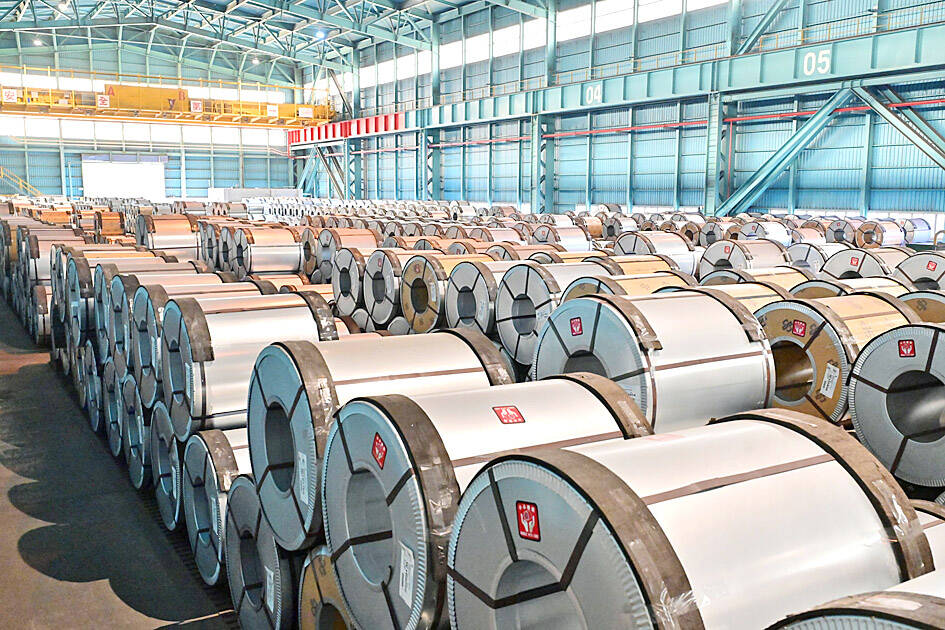China Steel Corp (中鋼) yesterday said it would raise its prices slightly for some products and leave others unchanged for domestic deliveries next month, after leaving them unchanged for two consecutive months.
The nation’s largest steelmaker said in a statement that it had accounted for downstream customers’ inventory replenishment demands and their export competitiveness, as the global steel market has staged a steady recovery.
As a result, it would increase prices for hot-rolled steel plates and coils, and cold-rolled steel coils by NT$300 per tonne (US$9.25), while keeping prices unchanged for other items such as electro-galvanized steel coils, hot-dipped zinc-galvanized steel coils and electro-magnetic steel coils, the Kaohsiung-based steelmaker said.

Photo courtesy of China Steel Corp
“The global steel market still faces oversupply, although demand is improving. Therefore, steel prices might stabilize in the short term due to seasonal demand or in response to inventory adjustments ending, but the company would not see a marked improvement in its product spreads in the medium term until there is further consolidation in the industry,” Fubon Securities Investment Services Co (富邦投顧) said in a note ahead of the release of China Steel’s price data.
Spreads refer to the difference between raw material costs and product prices, with China Steel facing narrower spreads amid rising costs over the past few quarters, indicating continued profit margin pressure.
In the first quarter, the firm posted an operating profit of NT$769 million, down 71.1 percent from the previous quarter, although revenue grew 6.1 percent sequentially to NT$93.75 billion and sales volume increased 6 percent to 2.88 million tonnes.
The decline in operating profit was mainly because prices of iron ore and coking coal rose 13 percent and 31 percent respectively quarter-on-quarter, while China Steel’s product prices only increased by a maximum of 5 percent over the quarter, the company said late last month.
First-quarter pretax profit fell 46.3 percent quarter-on-quarter to NT$1.48 billion, but improved significantly from a year earlier thanks to gross margin and sales volume growth, as well as non-operating investment and foreign exchange gains, the firm said.
China Steel yesterday said that raw material prices are still increasing due to an improved outlook in China, with iron ore costing US$115 to US$120 per tonne, up more than 20 percent from last month’s lows, and coking coal costing US$240 to US$245 per tonne, an increase from US$220 to US$230 per tonne a month earlier.
However, the company said it is positive about the price outlook in the near term, as several European steel mills recently announced price increases and signs of a rebound are starting to emerge in Southeast Asia.
Chinese peers Baowu Steel Group Ltd (寶武鋼鐵), Angang Steel Group Co (鞍山鋼鐵) and Benxi Steel Group Co (本溪鋼鐵) also slightly raised their steel plate prices for next month, further bolstering market sentiment, China Steel said.

NOT JUSTIFIED: The bank’s governor said there would only be a rate cut if inflation falls below 1.5% and economic conditions deteriorate, which have not been detected The central bank yesterday kept its key interest rates unchanged for a fifth consecutive quarter, aligning with market expectations, while slightly lowering its inflation outlook amid signs of cooling price pressures. The move came after the US Federal Reserve held rates steady overnight, despite pressure from US President Donald Trump to cut borrowing costs. Central bank board members unanimously voted to maintain the discount rate at 2 percent, the secured loan rate at 2.375 percent and the overnight lending rate at 4.25 percent. “We consider the policy decision appropriate, although it suggests tightening leaning after factoring in slackening inflation and stable GDP growth,”

DIVIDED VIEWS: Although the Fed agreed on holding rates steady, some officials see no rate cuts for this year, while 10 policymakers foresee two or more cuts There are a lot of unknowns about the outlook for the economy and interest rates, but US Federal Reserve Chair Jerome Powell signaled at least one thing seems certain: Higher prices are coming. Fed policymakers voted unanimously to hold interest rates steady at a range of 4.25 percent to 4.50 percent for a fourth straight meeting on Wednesday, as they await clarity on whether tariffs would leave a one-time or more lasting mark on inflation. Powell said it is still unclear how much of the bill would fall on the shoulders of consumers, but he expects to learn more about tariffs

Greek tourism student Katerina quit within a month of starting work at a five-star hotel in Halkidiki, one of the country’s top destinations, because she said conditions were so dire. Beyond the bad pay, the 22-year-old said that her working and living conditions were “miserable and unacceptable.” Millions holiday in Greece every year, but its vital tourism industry is finding it harder and harder to recruit Greeks to look after them. “I was asked to work in any department of the hotel where there was a need, from service to cleaning,” said Katerina, a tourism and marketing student, who would

i Gasoline and diesel prices at fuel stations are this week to rise NT$0.1 per liter, as tensions in the Middle East pushed crude oil prices higher last week, CPC Corp, Taiwan (台灣中油) and Formosa Petrochemical Corp (台塑石化) said yesterday. International crude oil prices last week rose for the third consecutive week due to an escalating conflict between Israel and Iran, as the market is concerned that the situation in the Middle East might affect crude oil supply, CPC and Formosa said in separate statements. Front-month Brent crude oil futures — the international oil benchmark — rose 3.75 percent to settle at US$77.01